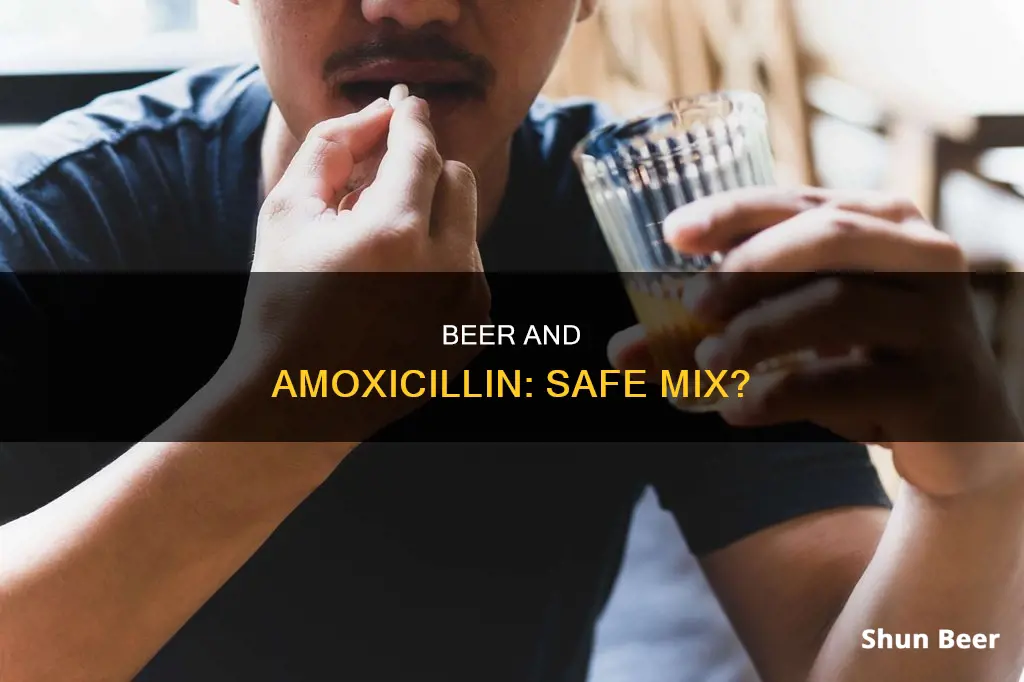
Amoxicillin is a commonly prescribed antibiotic used to treat various bacterial infections, including respiratory, skin, and urinary tract infections. While it is considered generally safe and well-tolerated, combining it with alcohol is not recommended. Alcohol can hinder the body's ability to fight infections and delay the healing process. Additionally, both substances can cause dehydration and have similar side effects, including dizziness, drowsiness, and impaired coordination, leading to an increased risk of accidents or injuries. Although some sources state that mild to moderate alcohol consumption with amoxicillin is safe, the side effects can be unpredictable and vary from person to person. To ensure optimal recovery and minimize potential risks, it is best to abstain from alcohol during antibiotic treatment.
| Characteristics | Values |
|---|---|
| Is it dangerous to drink beer while taking amoxicillin? | It is not dangerous to drink beer while taking amoxicillin, but it is highly recommended that potential drinkers abstain. |
| What is amoxicillin? | Amoxicillin is an antibiotic used to treat bacterial infections. It is one of the most commonly prescribed medications in the US. |
| How does alcohol affect amoxicillin? | Alcohol can slow the absorption rate of amoxicillin, making it less effective. Alcohol can also increase the side effects of amoxicillin, such as nausea and abdominal discomfort. |
| What are the side effects of drinking alcohol and taking amoxicillin? | The side effects include nausea, vomiting, diarrhoea, drowsiness, severe allergic reactions, internal bleeding, heart problems, and long-term or permanent damage to internal organs. |
| When can you drink alcohol after taking amoxicillin? | It is recommended to wait at least 48-72 hours after completing a course of amoxicillin before drinking alcohol. |
What You'll Learn

Amoxicillin is a commonly prescribed antibiotic
Amoxicillin is often the go-to medication for treating ENT, bronchopulmonary, and pleural infections. It is also prescribed with other drugs to treat bacterial infections such as duodenal ulcers and H. pylori infections. It is available as a sterile sodium injection for those who cannot take oral medications and as Amoxicillin trihydrate, which comes in a chewable tablet form.
Amoxicillin is generally considered a safe and effective medication. However, like any drug, it can cause side effects in some people. Common mild to moderate side effects include nausea, abdominal discomfort, and dizziness. More severe side effects, though rare, can include bleeding, bruising, yellowing of the skin or eyes, breathing difficulties, and moderate to severe allergic reactions such as itching or swelling. It is worth noting that the severity of side effects may depend on the individual's sensitivity to the drug.
Due to its wide prescription, many people wonder if it is safe to consume alcohol while taking amoxicillin. While there are no reported side effects specific to drinking alcohol while on amoxicillin, alcohol use could increase the common side effects of the drug. Additionally, alcohol can slow down the absorption rate of amoxicillin, delaying its effectiveness in treating infections.
Although drinking alcohol while taking amoxicillin is not life-threatening, it is generally recommended to abstain from alcohol during the course of antibiotic treatment. This is because alcohol can weaken the immune system, making it harder for the body to fight off infections. Alcohol can also cause dehydration, which can further hinder the healing process. Therefore, it is advisable to wait for at least 48 to 72 hours after completing the course of amoxicillin before consuming alcohol.
Understanding Beer Columns: Brewing Process Simplified
You may want to see also

Alcohol can hinder the body's immune response
Alcohol can have a detrimental effect on the body's immune response in several ways. Firstly, it can disrupt the structure and integrity of the gastrointestinal (GI) tract, which is typically the first point of contact for alcohol as it passes through the body. This can lead to a disruption in the gut microbiome, which is essential for the maturation and function of the immune system. Alcohol also damages epithelial cells, T cells, and neutrophils in the GI system, impairing the gut barrier function and allowing bacteria to leak into the circulation.
Secondly, alcohol consumption can increase the risk of developing acute respiratory stress syndromes (ARDS), sepsis, alcoholic liver disease (ALD), and certain cancers. It can also lead to a higher incidence of postoperative complications and slower recovery from infection and physical trauma, including poor wound healing. Alcohol can further weaken the body's defences by decreasing the frequency of lymphocytes and increasing the risk of bacterial and viral infections.
Additionally, alcohol can affect the function of innate immune cells, such as monocytes and dendritic cells, in a dose and time-dependent manner. Acute high-dose exposures can inhibit pro-inflammatory cytokine production, while long-term treatments can stimulate it. Chronic alcohol consumption can also inhibit phagocytosis, which is the process of clearing dying cells, and reduce the production of growth factors.
Finally, alcohol abuse is associated with a reduction in CD4 and CD8 T cell numbers and an increase in activated CD8 T cells. It can also lead to shifts in T lymphocyte phenotype, with a decrease in naïve T cells and an increase in memory T cells. This accumulation of memory T cells is linked to an increased incidence of chronic inflammatory diseases and age-related pathologies. Overall, alcohol consumption can hinder the body's immune response by impairing its ability to defend against infection, contributing to organ damage, and impeding recovery from tissue injury.
Straw Sipping: Does It Make Beer Stronger?
You may want to see also

Combining amoxicillin and alcohol can increase side effects
Amoxicillin is a prescription-only antibiotic used to treat bacterial infections. It is one of the most commonly prescribed medications in the US, with over 50 million prescriptions filled each year. It is considered safe for everyone, including children and pregnant women.
Alcohol can slow down the absorption rate of amoxicillin, delaying its effectiveness. While this doesn't reduce the drug's efficacy, it can allow the infection to progress before the antibiotic takes effect. Additionally, alcohol can cause gastrointestinal issues, disrupt sleep patterns, and stop the body from absorbing vital nutrients, all of which can hinder the healing process.
Both alcohol and amoxicillin can cause dehydration, and combining them can intensify this effect. Dehydration is especially concerning when dealing with side effects such as diarrhea, which can further dehydrate the body.
Other common side effects of combining alcohol and amoxicillin include nausea, vomiting, drowsiness, and dizziness. In more severe cases, mixing the two can result in severe diarrhoea, severe allergic reactions, internal bleeding, heart problems, and long-term or permanent damage to internal organs.
The effects of combining alcohol and amoxicillin can be unpredictable and vary from person to person. It is crucial to understand how the two interact and to follow the advice of medical professionals. It is generally recommended to wait at least 72 hours after finishing a course of amoxicillin before consuming alcohol.
Beer Drinking: Cold or Not?
You may want to see also

Drinking alcohol while taking amoxicillin may delay healing
Amoxicillin is a commonly prescribed antibiotic used to treat various bacterial infections, including respiratory, skin, urinary tract, and ear infections. While drinking alcohol while taking amoxicillin is not as dangerous as mixing alcohol with other drugs, it is still generally recommended to abstain from alcohol consumption during antibiotic treatment. This is because alcohol can hinder the body's ability to heal and recover from infections.
Furthermore, consuming alcohol while taking amoxicillin can put an additional strain on the liver, potentially leading to liver overload and toxicity. The liver is responsible for metabolizing both alcohol and amoxicillin, and the simultaneous presence of these substances can affect its ability to function optimally. This increased workload on the liver may result in liver-related complications, especially for individuals with pre-existing liver conditions.
Another concern is the potential for gastrointestinal issues when mixing alcohol and amoxicillin. Both substances can irritate the gastrointestinal lining, leading to increased susceptibility to gastrointestinal side effects such as nausea, vomiting, diarrhoea, and stomach cramps. Alcohol-related gastrointestinal disturbances, such as irritation and inflammation in the stomach and intestines, can further delay healing and impact the body's ability to absorb and process amoxicillin effectively.
Additionally, alcohol can impair judgement and decision-making abilities, increasing the risk of non-compliance with antibiotic treatment. This means individuals may forget to take their antibiotics as prescribed or skip doses, hindering the treatment's effectiveness and potentially prolonging the healing process.
While the effects of combining alcohol and amoxicillin are typically mild, they can vary from person to person and are unpredictable. To ensure optimal healing and recovery, it is generally recommended to avoid alcohol consumption during antibiotic treatment with amoxicillin. Consulting with a healthcare provider is crucial to receive personalized advice based on medical history and specific antibiotic regimens.
Drinking Beer on 21-Day Fix: Is It Possible?
You may want to see also

It is recommended to consult a healthcare provider
Amoxicillin is a commonly prescribed antibiotic used to treat bacterial infections. It is considered safe for everyone, including children and pregnant women. However, it is important to consult a healthcare provider or medical practitioner when taking amoxicillin to ensure safe usage and avoid potential side effects.
Healthcare providers can advise on the appropriate dosage and duration of treatment, which may vary depending on the individual and the type of infection being treated. They can also provide guidance on any potential side effects, which can range from mild to severe. Mild side effects may include nausea, vomiting, diarrhoea, or drowsiness, while more severe side effects can include severe diarrhoea, allergic reactions, internal bleeding, heart problems, and long-term or permanent organ damage.
Additionally, it is important to disclose any other medications or supplements being taken, as amoxicillin may not mix well with certain substances. This includes alcohol, as drinking alcohol while taking amoxicillin can worsen symptoms, magnify side effects, and delay healing. Research suggests that amoxicillin is absorbed more slowly when consumed with alcohol, which may allow the infection to progress.
While some sources indicate that mild to moderate alcohol consumption while taking amoxicillin is safe, healthcare providers will often advise against mixing the two. This is because the side effects of combining alcohol and amoxicillin can be unpredictable and vary from person to person. Alcohol consumption can also negatively impact gut health, weaken the immune system, and cause dehydration, all of which can interfere with the body's ability to heal and recover from infection.
Therefore, it is recommended to consult a healthcare provider for personalised advice and to ensure safe and effective usage of amoxicillin. They can provide guidance on the appropriate dosage, duration of treatment, and potential side effects, as well as advise on the consumption of alcohol or other substances during treatment.
Drinking 10 Beers: Is It Possible?
You may want to see also
Frequently asked questions
While it may be safe to consume a beer or two while taking amoxicillin, it is highly recommended to abstain from alcohol to give your body the best chance to fight the infection.
Drinking alcohol while taking amoxicillin can lead to adverse side effects and interactions. Alcohol can hinder the body's immune response, weakening its ability to fight infections. It can also intensify side effects such as dizziness, drowsiness, impaired coordination, and gastrointestinal issues like nausea, vomiting, and diarrhoea.
Consuming alcohol while taking amoxicillin can potentially lead to long-term or permanent damage to internal organs, including the liver. Alcohol can put additional strain on the liver, affecting its ability to function optimally. This is especially concerning for individuals with pre-existing liver conditions.







